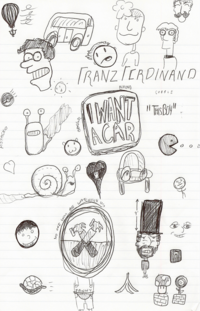- Doodle
-
A doodle is an unfocused drawing made while a person's attention is otherwise occupied. Doodles are simple drawings that can have concrete representational meaning or may just be abstract shapes. Stereotypical examples of doodling are found in school notebooks, often in the margins, drawn by students daydreaming or losing interest during class. Other common examples of doodling are produced during long telephone conversations if a pen and paper are available.
Popular kinds of doodles include cartoon versions of teachers or companions in a school, famous TV or comic characters, invented fictional beings, landscapes, geometric shapes and patterns, textures, banners with legends, and animations made by drawing a scene sequence in various pages of a book or notebook.
Contents
Etymology
The word doodle first appeared in the early 17th century to mean a fool or simpleton.[1] It derives from the German dudeln, to play (originally, to play the bagpipe or dudelsack).[citation needed] German variants of the etymon include Dudeltopf, Dudentopf, Dudenkopf, Dude and Dödel. American English dude may be a derivation of doodle.
The meaning "fool, simpleton" is intended in the song title "Yankee Doodle", originally sung by British colonial troops prior to the American Revolutionary War. This is also the origin of the early eighteenth century verb to doodle, meaning "to swindle or to make a fool of". The modern meaning emerged in the 1930s either from this meaning or from the verb "to dawdle", which since the seventeenth century has had the meaning of wasting time or being lazy.
In the movie Mr. Deeds Goes to Town, Mr. Deeds mentions that "doodle" was a word made up to describe scribblings to help a person think. According to the DVD audio commentary track, the word as used in this sense was invented by screenwriter Robert Riskin. Internet giant Google has given a new dimension to the word by having "doodles" in its main page on certain acclaimed occasions.
Effects on memory
According to a study published in the scientific journal Applied Cognitive Psychology, doodling can aid a person's memory by expending just enough energy to keep one from daydreaming, which demands a lot of the brain's processing power, as well as from not paying attention. Thus, it acts as a mediator between the spectrum of thinking too much or thinking too little and helps focus on the current situation. The study was done by Professor Jackie Andrade, of the School of Psychology at the University of Plymouth, who reported that doodlers in her experiment recalled 7.5 pieces of information (out of 16 total) on average, 29% more than the average of 5.8 recalled by the control group made of non-doodlers.[2]
See also
- Asemic writing
- Automatic writing
- Drolleries
- Graphology
- Marginalia
- Oekaki
- Scribble
- Stream of consciousness writing
- Stick Figure
- Ulam Spiral
References
- Spiegel, Alix (March 12, 2009). "Bored? Try Doodling To Keep The Brain On Task". NPR.org. http://www.npr.org/templates/story/story.php?storyId=101727048. Retrieved June 10, 2011.
- Hanusiak, Xenia (October 6, 2009). "The lost art of doodling". Smh.com.au. http://www.smh.com.au/opinion/society-and-culture/the-lost-art-of-doodling-20091006-gkah.html. Retrieved June 10, 2011.
- Jerome, Louie (November 20, 2007). "How Do You Doodle: Your Sketches May Be Giving Away Your Secrets". Socyberty.com. http://socyberty.com/psychology/how-do-you-doodle-your-sketches-may-be-giving-away-your-secrets/. Retrieved June 10, 2011.
- Leong, Kristie (July 9, 2009). "Does Doodling Help with Memory?". Socyberty.com. http://socyberty.com/psychology/does-doodling-help-with-memory/. Retrieved June 10, 2011.
- "Doodling As A Creative Process". Enchantedmind.com. http://www.enchantedmind.com/html/creativity/techniques/art_of_doodling.html. Retrieved June 10, 2011.
- "Sunni Brown: Doodlers, unite!". ted.com. http://www.ted.com/talks/sunni_brown.html. Retrieved September 23, 2011.
Footnotes
- ^ "doodle", n, Oxford English Dictionary. Accessed April 29th, 2009.]
- ^ Andrade, Jackie (January 2010). "What does doodling do?". Applied Cognitive Psychology 24 (1): 100–106. doi:10.1002/acp.1561.
Categories:
Wikimedia Foundation. 2010.

